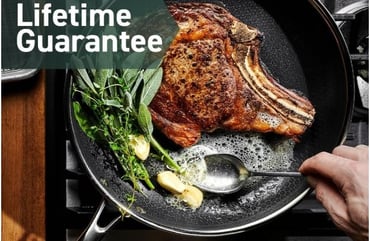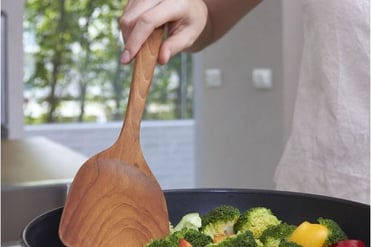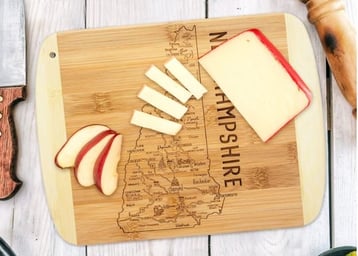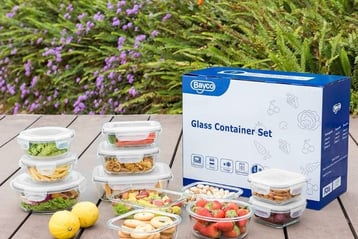Transform Your Kitchen, Transform Your Health: 5 Must-Have Non-Toxic Kitchen Accessories
5/28/20254 min read


Healthy Cooking Begins Here
What if I told you the secret to vibrant health isn't just what you eat, but how you prepare it? For years, we've focused on ingredients, but the often-overlooked truth is: your kitchen tools might be silently undermining your well-being. From the cookware you use to the containers storing your leftovers, the materials in your kitchen play a surprisingly significant role in your long-term health.
It wasn't until I started delving deeper into wellness that I looked beyond my diet and into the very tools I used every day. I began to observe how my friends' and family's physical well-being often reflected their lifestyle habits – and surprisingly, the materials and tools they used in their kitchen.
While we can't always control dietary choices, we can empower ourselves to create a healthier food preparation environment. Your cookware, storage solutions, and everyday utensils are more than just tools; they're silent contributors to your family's health. The good news? Making simple, informed swaps from toxic, synthetic materials to safer, eco-conscious alternatives can lay a powerful foundation for a cleaner, healthier lifestyle.
Based on my extensive research, hands-on product testing, and a genuine passion for holistic wellness, I've compiled a list of five essential kitchen accessories. These aren't just aesthetically pleasing additions; they're strategic investments that can significantly reduce toxin exposure, enhance nutrition, and truly kickstart a non-toxic lifestyle right in your home.
1. HexClad Hybrid Cookware
Why it matters: Most nonstick pans contain chemicals like PTFE (Polytetrafluoroethylene) and PFOA (Perfluorooctanoic Acid).
PTFE, commonly known as Teflon, offers nonstick properties but can release toxic fumes when overheated.
PFOA, though largely phased out, was linked to various health issues and used in the manufacturing of PTFE. HexClad offers a revolutionary laser-etched design that combines the durability of stainless steel with a PFOA-free nonstick surface, ensuring performance without the toxins.
Health Impact: Cooking with HexClad significantly reduces your exposure to potentially harmful chemicals and their associated health risks, ensuring cleaner, purer meals without concerns about toxic leaching or strange aftertastes. You gain better control over your ingredients and peace of mind.
2. FSC-Certified Wooden Spoons & Spatulas
Why it matters: Every time you use plastic or silicone utensils with hot food, there’s a chance microplastics and harmful additives can seep into your meals.
Microplastics are tiny plastic particles that can accumulate in the body over time.
FSC (Forest Stewardship Council)-certified products ensure the wood is sourced from responsibly managed forests, significantly reducing environmental harm.
Health Impact: Beyond avoiding microplastic contamination, wooden utensils are naturally antimicrobial, resisting bacterial growth in tiny cracks (unlike plastic). They also offer superior durability and won't melt or degrade under high heat, providing a safer and more hygienic cooking experience. Choosing FSC-certified wooden tools is better for both your health and the environment.
3. New Hampshire Bowl & Board Products (Wooden Cutting Boards)
Why it matters: Your cutting board is one of the most frequently used items in your kitchen.
Plastic boards can develop deep grooves that trap bacteria.
Many plastic boards are made with adhesives and finishes that contain formaldehyde or other chemicals. Products from New Hampshire Bowl & Board use natural, sustainably sourced hardwoods and are treated only with food-safe oils.
Health Impact: By resisting deep cuts that trap bacteria and naturally inhibiting microbial growth, these wooden boards offer a superior hygienic surface. Furthermore, their non-toxic, food-safe finishes eliminate chemical exposure during your daily meal preparation, safeguarding your ingredients.
4. Glass Food Storage Containers
Why it matters: Plastic containers can release endocrine-disrupting chemicals like BPA (Bisphenol A), especially when exposed to heat.
BPA is a synthetic compound linked to hormone disruption, obesity, and even cancer.
Even "BPA-free" plastics may leach similar compounds. Glass is non-porous and doesn’t release harmful substances, making it the superior choice.
Health Impact: Switching to glass completely eliminates concerns about plastic-derived chemical exposure, especially when reheating. Glass is also incredibly durable, resistant to odors and stains, and provides a clear, safe, and sustainable solution for all your food storage needs.
5. Reusable Foil Alternatives (Silicone Baking Mats & Beeswax Wraps)
Why it matters: Aluminum foil, especially when used to cook acidic foods like tomatoes or citrus, can leach aluminum into your food.
While the link between aluminum and Alzheimer’s is still debated, reducing exposure is generally advisable.
Reusable alternatives like silicone baking mats or beeswax wraps are non-toxic and eco-friendly.
Health Impact: Embracing reusable alternatives drastically cuts down on potential metal leaching into your food, providing a safer cooking and storage environment. Moreover, opting for food-grade silicone baking mats or natural beeswax wraps significantly reduces your household waste, contributing to a healthier planet while safeguarding your health.
Final Thoughts
Your journey to vibrant health isn't solely defined by gym routines or restrictive diets. It truly begins with your daily habits, and the kitchen stands as the foundational "battleground." The tools you choose are just as critical as the ingredients you select. By now, you understand the importance of terms like PTFE, BPA, microplastics, and FSC certifications – empowering you to make truly informed choices.
Investing in safe, non-toxic, and sustainably sourced kitchen accessories isn't a fleeting trend; it's a proactive investment in your family's long-term health and well-being. These are the very tools I personally rely on and recommend with absolute confidence. They've not only elevated my cooking experience but, more importantly, ensured my meals are prepared in the safest possible environment.
Don't feel overwhelmed; start with just one strategic swap from this list. Experience the tangible difference it makes. And from that small change, begin building a healthier, more vibrant future – one conscious meal at a time.
Ready to transform your kitchen and, by extension, your health? Which non-toxic kitchen essential will you prioritize first?







